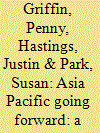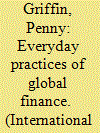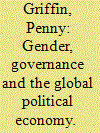|
|
|
Sort Order |
|
|
|
Items / Page
|
|
|
|
|
|
|
| Srl | Item |
| 1 |
ID:
118015


|
|
|
|
|
| Publication |
2013.
|
| Summary/Abstract |
As one of the preeminent academic conferences on international studies in the Asia Pacific, the 2012 Oceanic Conference on International Studies, held at the University of Sydney (with co-sponsors at the University of New South Wales, the University of Technology, Sydney, and Macquarie University) from 18 to 20 July, played host to a large number of academics and international analysts who presented research on a variety of international studies topics. After a very successful conference in Auckland that emphasized the connection of the OCIS community to the Oceanic region, it seemed fitting that the conference would come to Sydney, the largest city in the Oceanic region, and one of the premier global cities in the Asia Pacific. In part because of the location of the conference, and because of the emphasis of many of the conference presentations on the Asia Pacific, no doubt inspired by underlying trends that are both exciting and worrying (sometimes at the same time), the organizers decided to focus this special issue of Global Change, Peace and Security on the challenges that the Asia Pacific faces, now and in the future. In short, this special issue is about the Asia Pacific going forward.
|
|
|
|
|
|
|
|
|
|
|
|
|
|
|
|
| 2 |
ID:
170391


|
|
|
|
|
| Summary/Abstract |
This article argues that practices of global finance provide a rich opportunity to consider gender's embodiment in everyday, but highly regulatory, financial life. Tracing a pathway through the rise of the ‘diversity agenda’ in global finance in the wake of the global financial crisis, the article asks how ‘diversity’ has shaped the global financial services industry, and whether it has challenged the reproduction of gendered power in global finance. Recent, innovative feminist political economy work has laid out a clear challenge to researchers of the global political economy to explore how everyday practices have become significant sites of gendered, regulatory power, and this article takes up this challenge, analysing how the rise of ‘diversity’ in financial services reveals the crucial intersections of gendered power and everyday economic practices. Using a conceptual framework drawn explicitly from Marysia Zalewski's work, this article advances critical inquiry into how gender has become an often unacknowledged way of writing the world of global finance, in ongoing, and problematic, ways. It proposes that the practices and futures of the diversity agenda in global finance provide a window into the persistent failure of global finance to reconfigure its foundational masculinism, and asks that financial actors begin to take seriously the foundational, gendered myths on which global finance has been built.
|
|
|
|
|
|
|
|
|
|
|
|
|
|
|
|
| 3 |
ID:
094029


|
|
|
|
|
| Publication |
2010.
|
| Summary/Abstract |
This article considers a range of governance actors (including also the role of political enquiry into the global political economy in and of itself) to analyse how neo-liberal governance strategies seek to socialise human bodies (female, male or otherwise) into a global system of neo-liberal economic productivity. Contemporary mechanisms of global governance, it is suggested, seek to engineer a capitalist 'market society' while claiming to 'empower' poor people. In recent years, 'empowerment' rhetoric in global governance has increasingly depended on measuring the 'economic' role(s) of women in developing countries, judging their contributions productive only where they can be gauged to directly contribute to 'formal economy' growth. Reinforcing the assumption that 'formal' contributions are the only contributions worth measuring, such rhetoric simultaneously eradicates all other (non-competitive and/or non-entrepreneurial) behavioural possibilities for women, while clearly excluding all those who are not 'women'. Against the instrumentalisation of gender (as a category pertaining only to women and studies of women), this article argues that gender in global governance means much more than simply describing whether people are male or female and quantifying their productive capacities accordingly. As a broad and complex category of analysis, gender enriches the dynamism both of our studies of and practices in the global political economy. To ignore gender's role in the global political economy is to fail to see the power that gender (as a composite part of the relations of power that drive systems of economic development and growth) brings to our everyday understandings, and especially to our understandings of economic 'common sense'.
|
|
|
|
|
|
|
|
|
|
|
|
|
|
|
|
|
|
|
|
|